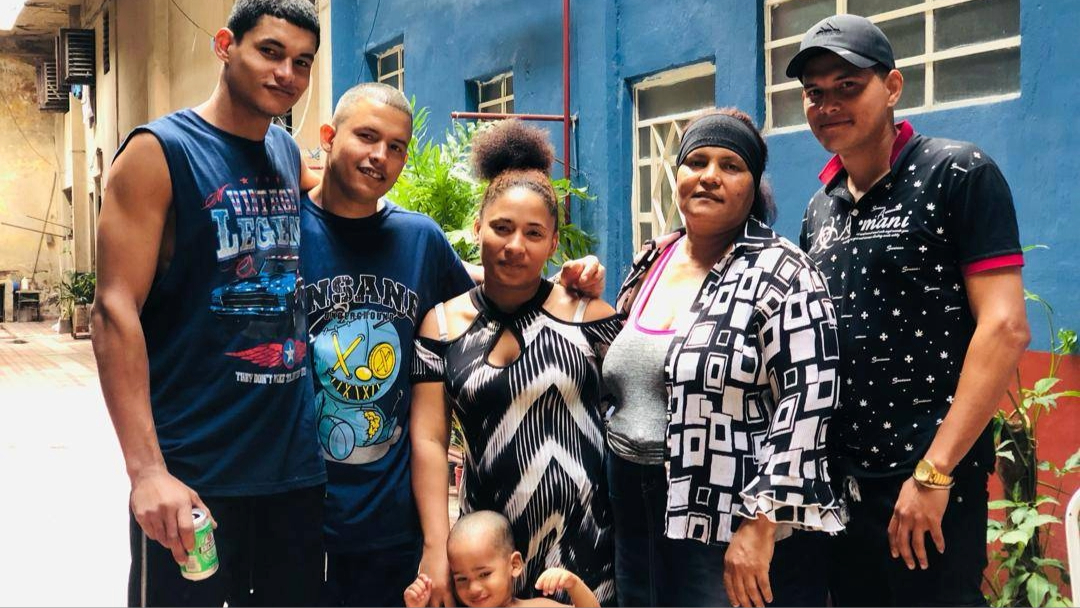Yindra Elizástigui, the mother of Luis Robles, who was recently denied parole by the regime, called on women with husbands, brothers, and, above all children who are political prisoners not to abandon their fights for their freedom.
"This appeal is, above all, to mothers. That's your son, your daughter, and we can't stop speaking out to condemn any injustice done to them. It's a right that we have, before the world, before God, a blessing that we have to defend, tooth and nail, and, above all, a duty to tell the truth," she said in a livestream on her Facebook profile.
In 2020 Luis Robles Elizástigui was sentenced to five years in prison for demonstrating with a sign on San Rafael Boulevard in Havana.
"We know that our children, our brothers, our husbands, are unjustly imprisoned. It's up to those of us who are out here to wage this battle. It's up to us to tell them to remain calm, not to despair, that everything will come in time, and not to be silent in the face of any situations they suffer inside. It's up to us to defend our children, it's up to us to scream," she reiterated.
"They're innocent. What they did, they did exercising a right that all human beings have," she added.
Robles, 31, is serving his sentence at a correctional labor camp near Prison 1580 known as "El 18." The young man, hailing from Guantánamo, has presented health problems and reported being a victim of cruel treatment and threats in prison.
This week Adel de la Torre, a 25-year-old man suffering from paranoid schizophrenia, imprisoned for peacefully demonstrating on 11-J in Havana, wrote a letter to his mother in which he asked her to tell the media and national and international human rights organizations about the mistreatment and torture suffered by him and other political prisoners with mental disorders.
"Inmates with mental illness suffer and have feelings, and are unable to defend themselves in prison. Someone must speak out for them," De la Torre said in the letter, published by Prisoners Defenders through his mother, Anayl Hernández Collado.
De la Torre is serving a seven-year prison sentence in Prison 1580, in San Miguel del Padrón, Havana, where he has been beaten by guards. "Beatings suffered by all the prisoners suffering from mental illnesses," prompting him to ask his mother to raise awareness of this situation.
Anayl Hernández Collado has already called for solidarity in the past in statements to the Cuban Human Rights Observatory (OCDH).
In 2017 De la Torre Hernández was diagnosed with a mental health condition, aggravated in prison due to the lack of treatment for his specific disorder. The young man was arrested on July 11, 2021, and released in September of that same year, but prosecuted and sentenced to prison a year later. While awaiting trial he participated as a rescuer in the Saratoga disaster.
"My son has been schizophrenic since 2017. He has been beaten by the prison police and put in a hole. He is a Christian, like me. I've had three strokes due to this situation. His father was schizophrenic, and paranoid, and died due to this suffering," Hernández Collado explained to OCDH in February of this year.
"They come to him and ask, 'Are you the Christian?' And three or four people beat him. They even wanted my son to take his own life. They said to him, 'Are you a Christian? Kill yourself, to see if your God saves you,' outrageous things like that," he added in his complaint.
The United Nations Standard Minimum Rules for the Treatment of Prisoners (Nelson Mandela Rules) say that the State has a responsibility to provide prisoners with medical services.
"The situation of political prisoners and prisoners of conscience is so serious that it has become a humanitarian issue. In addition to the dreadful prison conditions, they're enduring harassment and abuse of power by jail staff and the political police," the OCDH stated.
The organization has documented other cases of political prisoners with serious mental health problems, such as Abel Lázaro Machado Conde, sentenced to nine years for alleged "public disorder and sabotage." He has an organic conduct disorder, with a high risk of suicide, hypothyroidism, anxiety and attention deficit disorder.
Amalio Álvarez González, sentenced to 15 years for the alleged crime of "sedition," is a patient with psychiatric disorders and tendencies to self-harm. He is motherless, as she committed suicide when he was just one year old.
Dayron Martín Rodríguez, sentenced to 22 years for the alleged crime of "sedition," is also serving time in prison. He suffers from schizophrenia, with a personal history of suicide attempts.
Walnier Luis Aguilar Rivera, sentenced to 12 years for the alleged crime of "sedition," has an organic borderline intellectual disability, having received psychiatric treatments since childhood. He is the father of two young children who are currently financially dependent on their paternal grandfather.
Yanley López Basulto, sentenced to eight years on charges of "repeated acts of sabotage, attacks and disturbing the peace" is a young man with a mixed personality disorder. He has been in psychiatric treatment since childhood. He has a family history of schizophrenia.
